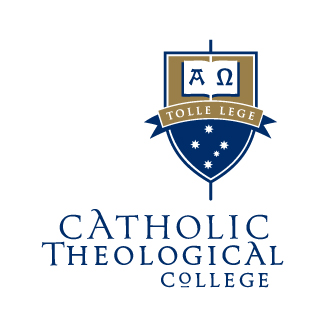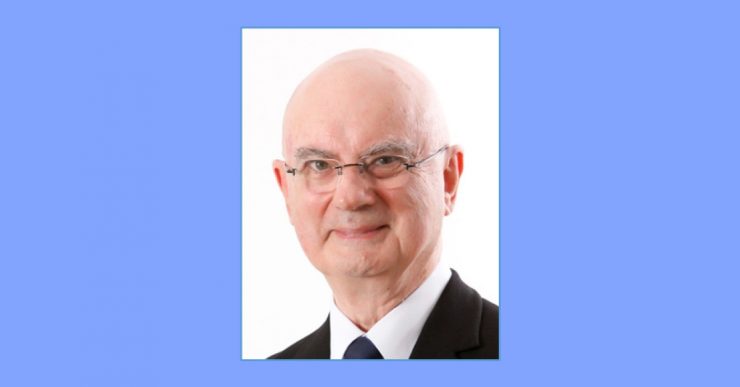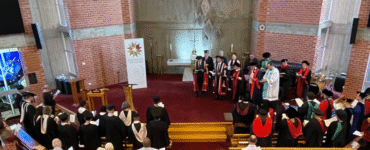This article was posted by Melbourne Catholic. Read the original here.
The ministry of the late Rev Prof Austin Cooper OMI had a significant and often transformative impact on the lives of many, not to mention on the landscape of theological education in Australia and beyond. Last month, Catholic Theological College (CTC) hosted a symposium exploring Fr Austin’s various contributions to Christian scholarship and formation, and as a spiritual friend to so many.
On Friday 10 May, more than 90 people gathered, either in person or online—including many of Fr Austin’s colleagues, fellow Oblates, family members, former students and friends—to hear speakers address topics ranging from Fr Austin’s early years and role in the establishment of CTC to his deep love for the history and spiritual masters of the Church, and his far-reaching influence as a teacher, mentor and friend.
After a time of prayer that drew on texts from many of the great spiritual writers Fr Austin loved—including St Benedict, St Teresa of Avila and St John Henry Newman—Prof Gabrielle McMullen (Deputy Chancellor of the University of Divinity) spoke about the important role Fr Austin played in the foundation of CTC.
Quoting from interviews conducted for a project exploring the founding and first decade of CTC for its 50th anniversary in 2022, Prof McMulllen described Fr Austin’s central role in bringing to life Archbishop Knox’s post–Vatican II vision for theological education in Melbourne—a vision in which theological studies would be ‘offered collaboratively across the provincial dioceses and religious orders’, and the laity and religious would ‘have access also to quality theological education alongside seminarians’.
Fr Austin was still a young Church historian, just embarking on his academic career, when Archbishop Knox recruited him to help launch a new theological college. In an interview transcript quoted by Prof McMullen, he spoke of being summoned to meet with Archbishop James Knox at Raheen, the Archbishop’s residence in Kew.
His goal was to create a very well-read clergy who ‘could match the interests of so many of their flock’.
‘He just sat me down and said, “Now you tell me what you think we need to do about the theological college,’ Fr Austin later recalled. ‘I thought this was rather remarkable … When he consulted me, I was quite young and he was an archbishop, so it was rather daunting to find that he would sit and listen to me.’
Serving as the first Master of the college from 1972 to 1976, and then again in 1992–1994 and 1998–2002, Fr Austin passionately pursued his plan to reshape Catholic theological education to more closely resemble the structure of a typical university degree.
‘I just felt that our study for priests should be about 60 per cent compulsory material, and about 40 per cent should be subjects people are interested in doing,’ he said. His goal was to create a very well-read clergy who ‘could match the interests of so many of their flock’.
As well as pursuing a fruitful partnership with neighbouring Monash University, he remained ‘strongly committed to the immensely enriching ecumenical endeavour opened by MCD [Melbourne College of Divinity] membership’.
‘One immediately felt it wasn’t them and us,’ Prof McMullen quoted him saying of faculty from other traditions and theological colleges. ‘One accepted them as colleagues working in a common cause, providing a very credible series of degrees in divinity. Maybe that was just the grace of baptism at work.’
Austin Cooper’s hands-on commitment to the realisation of his own dream has most likely done more for theological education in this city and beyond than any other single Catholic leader.
These early, formative years of CTC were also explored at the symposium in a paper prepared by scripture scholar Rev Prof Frank Moloney SDB AM and presented, in Fr Moloney’s absence, by Rev Dr Max Vodola (Associate Dean of Research and head of the Church History Department at CTC).
Joining CTC’s faculty in 1976, when Fr Austin was still Master, Fr Moloney remembered the college in those years as ‘an exciting and busy place’, saying that right from their first encounter, Fr Austin, ‘made it clear that his dream was to create an academic situation where all were welcome and where critical and quality teaching and research took place’.
Under Fr Austin’s leadership, Fr Moloney observed the development of ‘an institution that was not only a seminary but also a university’ and ‘an unprecedented awareness of the mutuality and richness of the community shared across the diversity of the diocesan clergy, religious women and men, Catholic and non-Catholic lay people’.
‘Austin Cooper’s hands-on commitment to the realisation of his own dream,’ he said, ‘has most likely done more for theological education in this city and beyond than any other single Catholic leader.’
This legacy has implications not just for theological education today but well into the future, he said. ‘We will betray Austin’s contribution if we are not to ask the question that was always with him: where to from here?
After lunch, in his own paper on Fr Austin’s contribution as Church historian and teacher, Fr Vodola described how history, ‘in the hands of Austin Cooper, came alive’.
The rule of St Benedict was as fresh and alive and adaptable for Austin in the contemporary Church as it was for its author in the 6th century.
‘Austin’s teaching touched the imagination of his students,’ he said. ‘It shifted their perspective on the great Christian tradition, and it made them want to read widely and study deeply and learn.’
Fr Austin’s students were encouraged ‘to become friends with the great characters of history,’ Fr Vodola said. ‘The rule of St Benedict was as fresh and alive and adaptable for Austin in the contemporary Church as it was for its author in the 6th century.’
Fr Austin also helped his students to appreciate ‘that we are all pilgrims in faith and to value the importance of material culture right under our noses’ he said—an observation that Dr Frances Baker RSM (a senior lecturer at CTC and Academic Dean of Corpus Christi College) expanded on as she spoke about the study tours she and Fr Austin led for many years, and about the methodology he used to help tour groups explore ‘the spirituality of place’.
Focusing on four places visited on different tours, Dr Baker described how in each of them—the Celtic monastic site at Glendalough in Ireland; Toledo and Madrid in Spain; the Isle of Iona in Scotland; and the Newman Centre at Littlemore in Oxford—Fr Austin provided both the historical context to help the group make sense of what they were seeing, and the time and opportunity to connect with the spirituality of the place.
A particularly moving example of this was a Eucharist they celebrated together in Madrid at the Oblate house from which 22 young seminarians and priests were taken and executed in 1936.
‘We gathered in a deepening silence awaiting the celebrants,’ she recalled. ‘No singing that day, no long homily either. But it was when two of our group, mothers with large families, prayed for their own children, that their faith might not fail, that each of us experienced the presence of God.’
Rev Assoc Prof John Dupuche, who teaches pastoral and spiritual studies at CTC, gave a paper on behalf of the late Dr Chris Morris, a former doctoral student and colleague of Fr Austin who, before his recent death, played a significant role in planning the symposium. As well as exploring Fr Austin’s deep engagement with spiritual texts, the talk would be, Fr Dupuche said, ‘a moment of tribute to Chris, who is sorely missed by all’.
‘Austin favoured conversation over lecturing,’ he said, ‘but this approach went hand in hand with precise knowledge of the literature.’ He wanted the text to speak for itself, but also for his students ‘to notice their own reactions to a text’ and ‘how the text applies to life’—to see it not as ‘a museum piece but a living reality’ and to ‘end the divorce between theology and spirituality’.
Great teachers influence us and shape us.
In a fitting conclusion to a day that had honoured a man who was friend to so many, Anne McElroy, a teacher of history and English at Genazzano FCJ College in Kew, spoke touchingly about her 30-year friendship with Fr Austin.
He introduced her and others, she said, to the lives of the saints, ‘speaking about them so conversationally, revealing them in their difference and their complexity to be our fellow human beings … I think he knew that experiencing the see-saw between faith and doubt, these people, these saints, provide some consolation and some recognition that in their struggles we can see perhaps a commonality with them.’
Auditing one of his courses ‘as a sort of dilettante’ in 2020, she came to share his deep interest in the origins and the development of the church in England, and in 2021, she joined Fr Austin’s class on John Henry Newman.
‘Great teachers influence us and shape us,’ she observed, ‘and Austin’s course on Newman has influenced my life’, making Newman ‘a closer friend’. Fr Austin’s friendship was also a ‘great gift’ to her. ‘I think of it like Newman’s bond of connection. It was one of the great privileges of my life.’
Fr Austin lived out the virtues of the scholar priest, with an enquiring mind and a pastor’s heart. He knew the human heart responds to beauty and goodness, and never tired offering people the riches of the Christian tradition
Other speakers at the symposium included historian of religion Prof Katherine Massam—who explored aspects of Fr Austin’s life and work in the light of the spiritual insights of some of his heroes, particularly St Benedict of Nursia, but also Dorothy Sayers, Hildegard of Bingham, and Archbishop John Polding OSB, first Archbishop of Sydney—and Fr Austin’s brother Oblate and CTC colleague Rev Dr Daniel Szewc OMI, who spoke on the influence of Oblate history and spirituality in Fr Austin’s life and work.
Very Rev Dr Kevin Lenehan, Master of CTC, said he was pleased the college could host a symposium recognising Fr Austin’s ‘unique and distinctive contribution to the Catholic community over several decades’. In all his roles, he said, ‘Fr Austin displayed wisdom, intelligence and faithful service. He was greatly appreciated for his humour, good sense and solid friendship. Fr Austin lived out the virtues of the scholar priest, with an enquiring mind and a pastor’s heart. He knew the human heart responds to beauty and goodness, and never tired offering people the riches of the Christian tradition.’

Catholic Theological College is a college of the University of Divinity from the Catholic tradition, based in Melbourne, Victoria.







Add comment